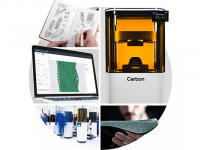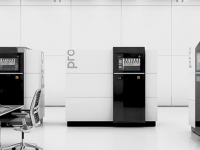Comparing SLA, DLP and PμSL
In this paper, we will compare laser-based SLA, Digital Light Processing (DLP) and Projection Micro Stereolithography (PμSL) and how each compare with the below factors.

June 28, 2021
Stereolithography (SLA) was invented by Chuck Hull in the 1980’s and formed the basis for founding 3D Systems, one of the leading companies in the industry. Since that time, there have been multiple variants of SLA, but all fundamentally using the process of curing a photo-sensitive material with light.
There are other additive manufacturing methods, like fused deposition modeling (FDM), selective laser sintering (SLS) and binder jet printing (BJP). They all work with the same basic premise of taking digital data and building a part layer by layer and they all have their unique advantages and disadvantages.
Photopolymerization as a category has the core advantage of allowing higher resolution and surface finish. It is why it is often the approach of choice in industries like dental, hearing aids, jewelry and other high quality applications.
Historically, the negative with photopolymerization was a limitation in the range of materials available and the ability to mimic engineering grade plastics. That has begun to change in recent years as new companies have entered the market, thus bringing forward the possibilities of combining the advantages of this method (high quality) with the materials needed for end-use applications.
Fill out the information below to download the resource.
Latest News






